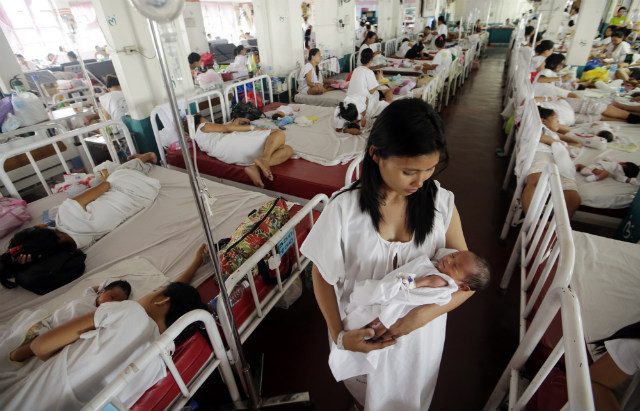SUMMARY
This is AI generated summarization, which may have errors. For context, always refer to the full article.

MANILA, Philippines – A recent survey showed that staying healthy has remained Filipinos’ top personal concern for 3 consecutive years since 2012.
It’s not surprising, then, that presidential candidates often mention their health agenda whenever they go around the country to campaign.
Liberal Party standard-bearer Manuel Roxas II banks on the achievements of the current administration and promises to continue the expansion of PhilHealth coverage in the country.
His rivals offer promises beyond expanding PhilHealth. Senator Grace Poe’s voucher system for patients and Davao City Mayor Rodrigo Duterte’s hospital facility for indigents are just some of the plans that build on the successes of the government’s national health insurance program.
PhilHealth has expanded through the years. Thanks to the sin tax law, the program has a 2016 budget of P43.84 billion that funds the health insurance premiums of indigents and senior citizens.
PhilHealth president Alex Padilla told Rappler in an interview that they now cover 100% of the poor, which is equivalent to around 15.3 million families identified through the National Household Targeting System for Poverty Reduction.
Population coverage is now at 92% or 93 million Filipinos, after the Expanded Senior Citizens Act was amended to provide health insurance to all senior citizens. (READ: Health care and the 2016 elections)
On top of its P128-billion reserve funds, PhilHealth collected total premiums worth P96 billion in 2015, and paid benefits amounting to P97 billion.
More investments needed
When presidential candidates vow to expand PhilHealth, what exactly do they mean? For Padilla, it means a promise to give more benefits to PhilHealth members – beyond the 9,000 different kinds of case rates the agency already has.
“I would think [candidates] would want to cover more benefits, make the benefits more extensive, more for the catastrophic, and lessen the out-of-pocket expenses in order to guarantee more financial risk protection to them,” Padilla told Rappler.
He revealed that the biggest out-of-pocket expense of Filipinos is medicine. Almost all presidential candidates vowed to equip public health facilities with essential medicines, and provide them for free, especially for the poor.
“The ideal health insurance program like [in] some countries abroad is 100% – no more expenses, wherever you go. But if you look at the trend, their investments are great…. We’re still far from 100% because, while I think 60% or 70% of the poor who go to public hospitals actually do not pay a single centavo based on our recent survey, still our out-of-pocket average expense is around 52%. So those from the middle class and above still shell out more than what PhilHealth pays for them.”
If candidates want to provide more benefits for Filipinos, Padilla said more investments should go into the health sector.
‘I think 10 years ago nobody talked about health, they were talking about basketball courts and whatever buildings they could build which could immediately be seen. Health is now really a steady component of any election campaign.’
Alex Padilla
President, PhilHealth
But he admitted revenues from the sin tax law can only go so far, and they have not increased premium contributions for years.
“The more benefits we want, the more we cover people, that has a corresponding payment or a corresponding increase in taxes somewhere later on, or even in the personal premium.”
PhilHealth also covers more and more vulnerable populations in the country.
“Minsan kasi ang mentality ng legislature, they think we have a lot of money. Okay, but you know, P97 billion is no joke, and our reserve is just P128 billion. Okay naman, but hindi lang naman papogi ‘yun. Siyempre sana bigyan din kami ng sources of clear funds,” Padilla explained.
(Sometimes the problem with the legislature is that they think we have a lot of money. Okay, but you know, P97 billion is no joke and our reserve is just P128 billion. That’s okay, but that’s not only for show. I hope we can be given sources of clear funds.)
“‘Yung sin tax is not only covering PhilHealth – again we have some issues on whether nabayaran kami nang tama. Pero, yes, for now it will work, but at the rate it’s going, ‘sinama na nga ‘yung seniors, ‘sinama na nga ‘yung women about to give birth, isasama pa ‘yung persons with disabilities.”
(The sin tax is not only covering PhilHealth – again we have some issues on whether we’re getting paid right. But, yes, for now it will work, but at the rate it’s going, they even included into PhilHealth the seniors and women about to give birth. They’re going to include even persons with disabilities.)
As it is, Padilla lamented, they have yet to collect their share of revenues from the documentary stamp tax law, as well as other excise taxes.
“I think those laws were formulated precisely to beef up the funding. If you keep adding more benefits, we will have to clarify also, how much are we going to be getting from the documentary [stamp tax], from the excise [taxes], in order also not to take it out from our people in terms of premium payments?”
On top of new benefits, Padilla said it’s also part of their process to continuously review existing case rates and increase their amount if necessary.
Alternatives
Jo-Ann Latuja Diosana, senior economist of policy advocacy group Action for Economic Reforms, agreed with Padilla that revenues from the sin tax law alone won’t be able to sustain proposals to increase PhilHealth benefits in the long run, especially since, after 2017, tobacco and alcohol excise tax rates will increase only by 4%.
“If there are such proposals, we really need to introduce other tax policies. Sin tax has been generating a lot, but remember…after 2017, the increase will only be incremental. You wouldn’t be able to sustain. You would be needing additional sources, or possibly increase that 4% annual increase.”
To support the needs of PhilHealth, Diosana suggested reforming the country’s fuel tax and the redundant fiscal incentives, and introducing excise tax on sugar-sweetened beverages.
But introducing tax reforms, especially controversial ones, will take a lot of time. This is a lesson health advocates learned when they pushed for the sin tax law, a measure that languished in Congress for over a decade.
“What they can do is to be more efficient with the use of money,” Diosana said of the presidential candidates’ promise to expand PhilHealth.

Other promises
Padilla also weighed in on other proposals related to PhilHealth (READ: Plans and promises: Presidential bets on health):
On Duterte’s free facility for the poor in every hospital. “Meron naman ang private, but they only allot 10% that they give out to charity. I think that’s some task to do dahil nga ang private usually mas malaki ang gastos nila or sinisingil nila sa mga tao.”
(Private hospitals have that facility, but they only allot 10% that they give out to charity. I think that’s some task to do because expenses in private hospitals are higher.)
On preventive health care proposed by Duterte, Poe, and Vice President Jejomar Binay. “We are embarking on a new program called Tsekap, we’ll spend P1,800 per family…. So we give P800 for diagnostics, an additional P1,000 for medicines. But, again, it’s just beginning. Again, it depends on the resources, but what is P1,800 if you talk of an entire family for a given year, that’s a small amount.
“We’re hoping that we will see the effect of effective preventive care. If our expenses on hospitals decrease, then we will translate that to more preventive care benefits and possibly increase our amounts even more.”
On Roxas’ PhilHealth-accredited women centers in isolated barangays. “What we want is a facility, not necessarily hospital…. We pay more in birthing homes than we do in hospitals, because the intention there is, hospitals are supposedly for advance care, while birthing homes should be enough for normal childbirth.”
On Poe’s voucher system. “It’s a matter of process or procedure. We’ve discussed this also within PhilHealth, it may be a good idea. I think it’s one system to try and lessen any leakage, but it’s also a way to try and pinpoint who really is in need.”
Diosana advised voters not only to listen to the candidates’ promises, but also to ask them questions. She lamented: “Whenever they give these promises, they get away with it. Hindi ganung kalakas ‘yung pag-exact natin ng accountability (We don’t aggressively exact accountability).”
But Padilla is still happy that health has become a focus of this election.
“I think 10 years ago nobody talked about health, they were talking about basketball courts and whatever buildings they could build which could immediately be seen. Health is now really a steady component of any election campaign,” he said.
Still, he urged candidates not to look at the short term because “health is not something you can see overnight.”
“You can see from an effective governance whether [the leader] takes care of his people by the numbers he’s able to generate through the years – [for example], decrease in the number of dengue cases or improvement in nutrition.”
Padilla takes it as a good sign that all candidates vowed to improve PhilHealth’s benefits and mechanisms, since he said it might be “suicidal” for the next president not to continue the reforms in the health sector. – Rappler.com
Read more from this series:
- Next president limited by Aquino admin budget for 2 years – Briones
- 5Ps and CCT: How will candidates’ anti-poverty promises be funded?
- Fixing traffic: Are presidential bets proposals viable for PH cities?
- Higher budget, free tuition in state colleges: Easier said than done
- Tax cuts as campaign promise? Overhaul tax system, economists say
Add a comment
How does this make you feel?
There are no comments yet. Add your comment to start the conversation.